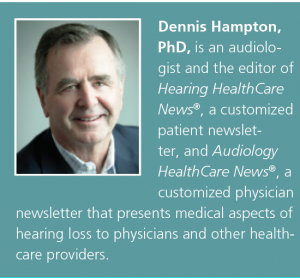
A long-term study of 2,040 older adults found that cognitive decline was significantly reduced in subjects who used hearing aids. Published in the June 2018 Journal of the American Geriatrics Society—and summarized by Dawes et al2 in the January 2019 Hearing Review—the data were drawn from the Health and Retirement Study over an 18-year period. Subjects were age 50 and older, had no dementia at baseline, and began using hearing aids during the 18-year period. Cognitive function was assessed using short-term and delayed recall of a list of 10 words (episodic memory).
Before using hearing aids, participants could remember 0.1 fewer words on the memory test per year on average; following hearing aid use, the average rate of decline was reduced to 0.02 fewer words recalled per year. The investigators stated this “suggests that effective identification and treatment of age-related hearing impairment may have a significant impact on age-associated cognitive trajectories and possibly reduce the incidence of dementia.”2
Click here to read the rest of the article from HearingReview.com.
Conclusion
There is now a significant body of research that strongly supports the importance of treatment for adults with hearing loss. Intervention not only reduces the social isolation, depression, and anxiety that untreated hearing loss can cause, but can also play an important role in minimizing cognitive decline and delaying the onset of dementia. The benefits are significantly improved quality of life for millions of adults, as well as billions of dollars in healthcare savings.
Correspondence can be addressed to Dr Hampton at: dchampton@hhcnews.com
Citation for this article: Hampton D. The case for preserving cognition with hearing aids. Hearing Review. 2019;26(2)[Feb]:20.
Published on
Research | February 2019 Hearing Review
References
-
Maharani A, Dawes P, Nazroo J, Tampubolon G, Pendleton N, on behalf of the SENSE-Cog WP1 group. Longitudinal relationships between hearing aid use and cognitive function in older Americans. J Am Geriatr Soc. 2018;66(6):1130-1136.
-
Dawes P, Maharani A, Nazroo J, Tampubolon G, Pendleton N, on behalf of the SENSE-Cog WP1 group. Evidence that hearing aids could slow cognitive decline in later life. Hearing Review. 2019;26(1):10-11.
-
Livingston G, Sommerlad A, Orgeta V, et al. Dementia prevention, intervention, and care. Lancet.2017;390(10113):2673-2734.
-
Hampton D. Nine risk factors associated with dementia. Hearing Review. 2018;25(8):22.
-
Lin FR, Metter J, O’Brien RJ, Resnick SM, Zonderman AB, Ferrucci L. Hearing loss and incident dementia. Arch Neurol. 2011;68(2):214-220.
-
Obuchi C, Harashima T, Shiroma M. Age-related changes in auditory and cognitive abilities in elderly persons with hearing aids fitted at the initial stages of hearing loss. Audiol Res.2011;1(e11):40-41.
-
Amieva H, Ouvrard C, Giulioli C, Meillon C, Rullier L, Dartigues J-F. Self-reported hearing loss, hearing aids, and cognitive decline in elderly adults: A 25-year study. J Am Geriatr Soc. 2015;63(10):2099-2104.

